The Story Around The Writing Of The Declaration Of Independence
With American freedom hanging by a thread, we need to remember the events surrounding the first time Americans decided they'd had enough.
On April 29, 1962, President John F. Kennedy held a dinner at the White House for western hemisphere Nobel Prize winners. In his opening remarks, he stated, “I want to tell you how welcome you are to the White House. I think this is the most extraordinary collection of talent, of human knowledge, that has ever been gathered together at the White House, with the possible exception of when Thomas Jefferson dined alone. Someone once said that Thomas Jefferson was a gentleman of 32 who could calculate an eclipse, survey an estate, tie an artery, plan an edifice, try a cause, break a horse, and dance the minuet. Whatever he may have lacked, if he could have had his former colleague, Mr. Franklin, here we all would have been impressed.
(Jefferson could even write in Greek with one hand while writing the same in Latin with the other.)
Jefferson was a lifelong optimist, despite numerous tragedies in his life
He lost his father whom he adored at 14, making him the man of the house. His father was only 49. Prior to his being chosen to write the Declaration, in August of 1775, Jefferson and his wife Martha lost their daughter Jane at only 1 1/2 years old. Jefferson and his wife lost two more daughters and a son before they were three years old. His mother died suddenly in March of 1776 from an apoplectic stroke at 57. He had two surviving daughters, Martha, the oldest named after her mother and Mary, who went by Polly when she was young. Both the girls accompanied Jefferson to Paris and studied at Abbaye Royale de Panthemont, a well-respected convent school in Paris.
Mary would later die in 1804 at only 25, a few months after giving birth to daughter Maria, who would only survive for two years. On a happier note, Martha gave Jefferson eleven grandchildren, whom he apparently doted over so much it contributed to his financial problems later in life.
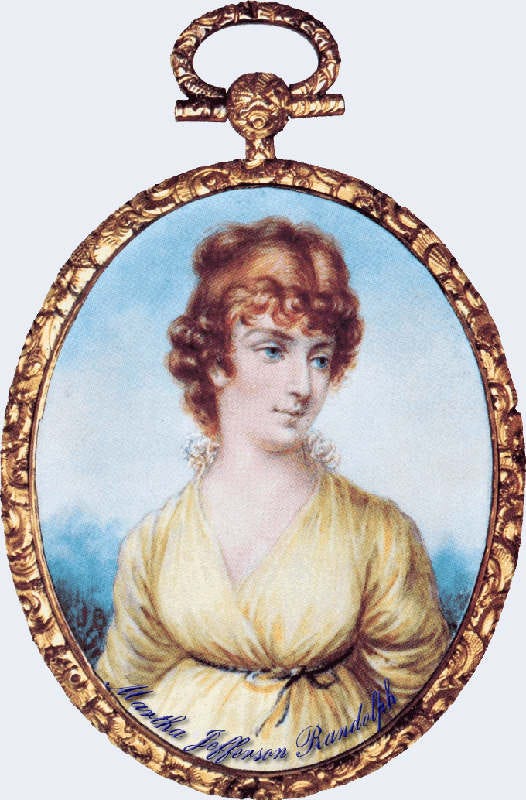
The most crushing tragedy of Jefferson's life was the death of his wife Martha Wayles Skelton, who died Sept. 6, 1782, at 33. In his daily log, Jefferson wrote, “My dear wife died this day at 11:45 a.m.”, the only thing written in it that day. She died a few months after delivering their last child, Lucy. His daughter Mary wrote this about her father:
As a nurse no female ever had more tenderness nor anxiety. He nursed my poor mother… sitting up with her and administering her medicines and drink to the last. For four months that she lingered, he was never out of calling; when not at her bedside, he was writing in a small room which opened immediately at the head of her bed.
With Martha's failing health, Jefferson came to a point in his life where he decided to quit politics for good, and devote himself to his family, farm and books. However, after months of inconsolable sorrow and grieving after Martha's death, he got hold of himself and decided to return to public service near the end of 1782. America and the world were absolutely the better for it.
The story of the writing of the Declaration of Independence
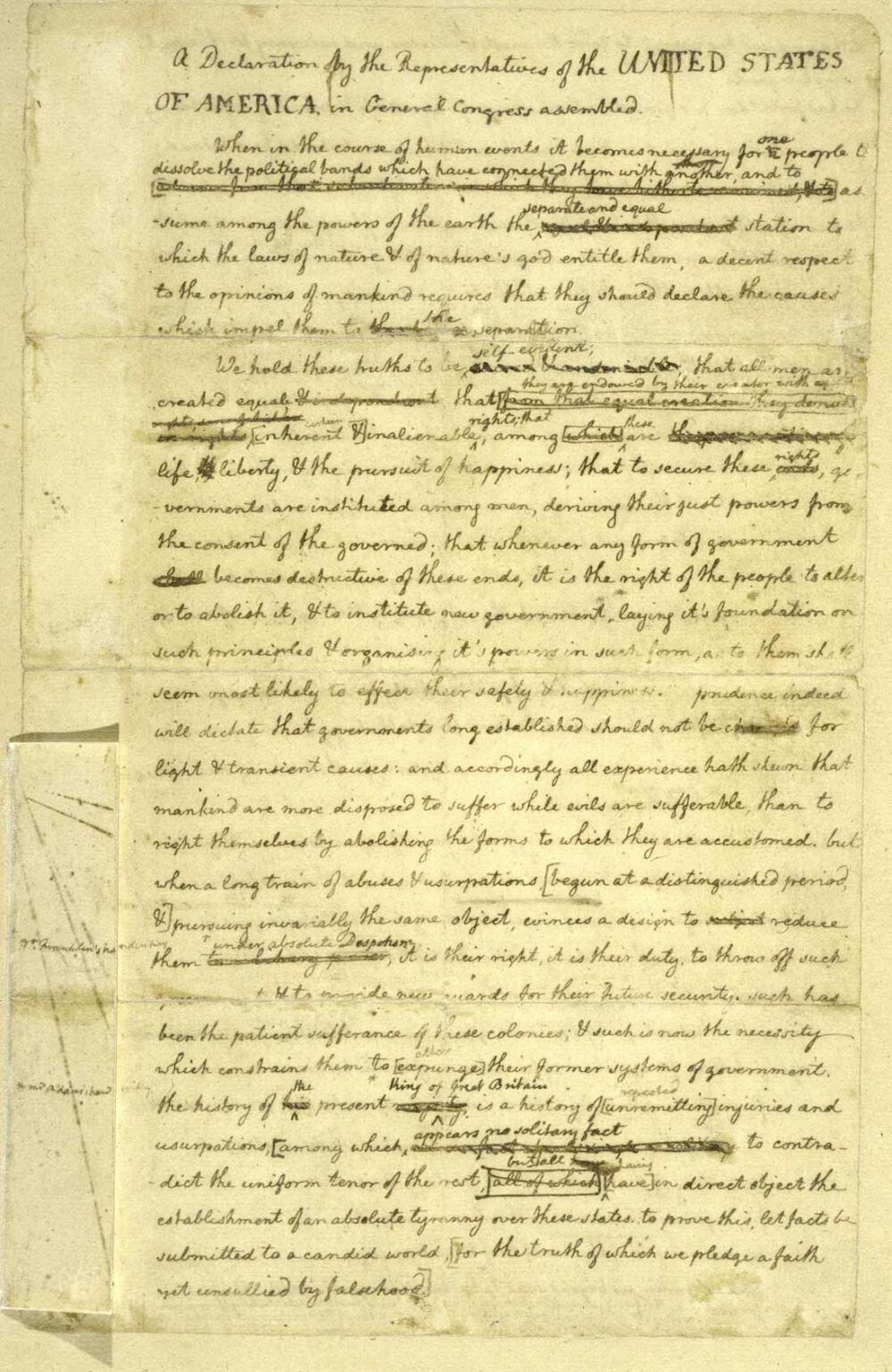
The colonies came to the conclusion that attempts at reconciliation with King George were pointless
On June 7, 1776, Richard Henry Lee, a delegate from Virginia, introduced a formal resolution in Congress for the complete separation from England. This motion was seconded by George Wythe of Virginia and John Adams of Massachusetts. The colonies of New York, New Jersey, Pennsylvania, Delaware, Maryland and South Carolina were not on board with this radical idea yet, so a final vote was postponed till July 1, 1776. In the meantime, to prevent as little delay as possible, a committee was chosen to write a Declaration of Independence.
The Committee to write the Declaration of Independence
The committee consisted of John Adams, Benjamin Franklin, Rodger Sherman, Robert R. Livingston and Thomas Jefferson. The committee’s first job was to pick one of them to write a draft. Franklin, being the oldest and well versed, was the logical choice, except his age was catching up with him. He was homebound due to a number of ailments including severe gout. Adams and Jefferson were skilled writers, so the choice was one of them. Jefferson's notes simply say the committee picked him. John Adams’ recollection was more interesting:
Jefferson proposed to me to make the draught. I said I will not; You shall do it. Oh No! Why will you not? You ought to do it. I will not. Why? Reasons enough. What can be your reasons? Reason 1st. You are a Virginian, and Virginia ought to appear at the head of this business. Reason 2d. I am obnoxious, suspected and unpopular; You are very much otherwise. Reason 3d: You can write ten times better than I can. “Well,” said Jefferson, “if you are decided I will do as well as I can.” - John Adams to Timothy Pickering, August 6, 1822
Jefferson begins writing the Declaration of Independence
This was the object of the Declaration of Independance. not to find out new principles, or new arguments, never before thought of, not merely to say things which had never been said before; but to place before mankind the common sense of the subject; [. . .] terms so plain and firm, as to command their assent, and to justify ourselves in the independant stand we [. . .] compelled to take. neither aiming at originality of principle or sentiment, nor yet copied from any particular and previous writing, it was intended to be an expression of the american mind, and to give to that expression the proper tone and spirit called for by the occasion. all it’s authority rests then on the harmonising sentiments of the day, whether expressed, in conversns in letters, printed essays or in “the elementary books of public right, as Aristotle, Cicero, Locke, Sidney, &c. - Thomas Jefferson letter to Henry Lee, May 8, 1825
Jefferson authored the Declaration of Independence, THE seminal statement on human rights, without a book or pamphlet for reference in just 17 days! Some have criticized that the ideas were borrowed from other writers. Jefferson never claimed otherwise. Yet no one before or since has been able to meld them all together with such eloquence.
Fun fact: Most Americans did not know Thomas Jefferson was the main author of the Declaration till the 1790’s. They just thought it was a collective effort of the Congress.
Jefferson rented a second-floor suite at the corner of Second and Market streets in Philadelphia. After the daily seasons of Congress, he would go there, place himself in a large armchair, set his portable desk in front of him, and write usually from 6 till midnight.
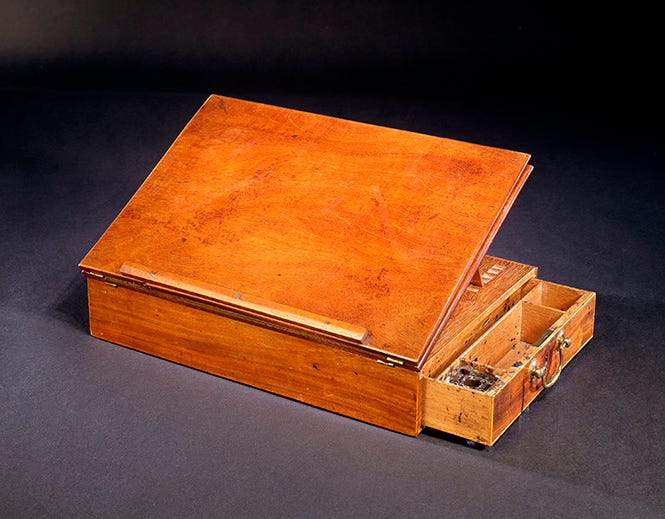
Jefferson submits his work to Benjamin Franklin and John Adams
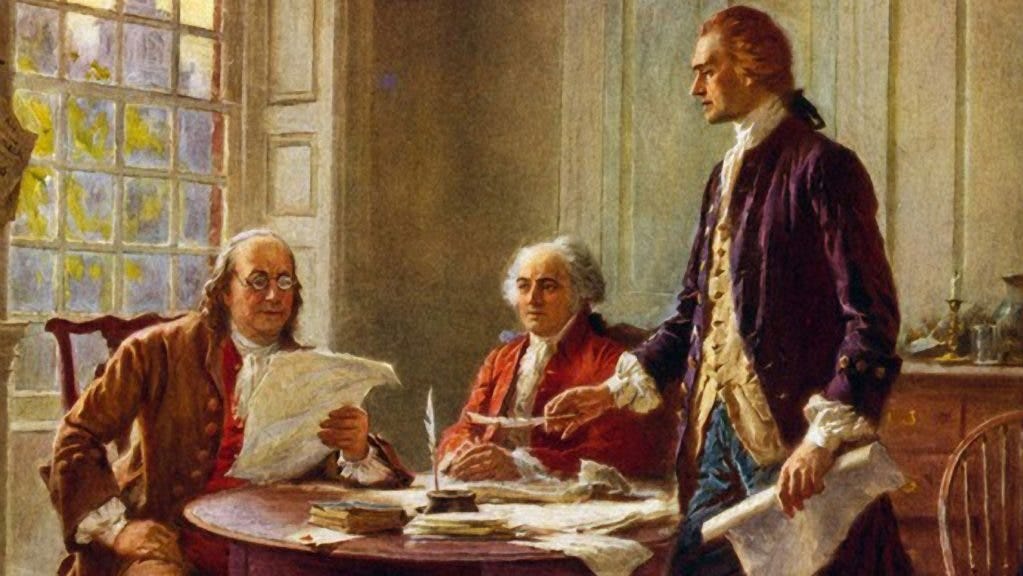
Franklin and Adams made only a few minor changes.
The draft was submitted to Congress Friday, June 28, 1776
Jefferson sat silently through three agonizing days of his fellow Congressman trying to “improve” his work. Benjamin Franklin sat next to him the whole time to offer comfort. John Adams adamantly defended every word, and Jefferson gratefully called him “the Colossus of that Congress.”
Regarding the fallacy it was written only for men, particularly white slave owners. In the original of the Declaration submitted to Congress, Jefferson included a 168-word grievance that England forced the abomination of buying and selling of "MEN" on the colonies and King George forbade them from abolishing it. Attacking the slave trade would have been as much an act of rebellion against Britain as was the attack on the tea trade. Only 11 of 13 colonies would have signed, with Georgia and South Carolina refusing. It was removed.
And America was born
After the Congress revised and deleted, including the above-mentioned text, about 1/5 of the document, the Declaration was finally approved on Friday afternoon, July 4, 1776. Once John Hancock, the President of the Congress, signed it and Secretary Charles Thompson attested to it, America was born. The news quickly spread throughout Philadelphia. Apparently, from several accounts, the first reading of the Declaration was shortly after it was approved on July 4, right outside on the Pennsylvania State House steps to whomever happened to be on the street at the time. Then the crowd followed the speaker, who is said to have been either Secretary Charles Thompson or his senior clerk, Timothy Matlack, to the courthouse where it was read again. The first printed copies of the Declaration of Independence came from the shop of John Dunlap, official printer to the Congress. The morning of July 5, copies were distributed by members of Congress to “various assemblies, conventions, and committees of safety as well as to the commanders of Continental troops. Also on July 5, a copy of the printed version of the approved Declaration was inserted into the "rough journal" of the Continental Congress for July 4.” On the following Monday, July 8, at noon the city's church bells rang, and crowds of people gathered outside the Pennsylvania State House, now Independence Hall. Then Colonel John Nixon stepped up on a small stage and began the first formal recitation of the Declaration of Independence:
If you never read it in its entirety, here's your chance!
In Congress, July 4, 1776
The unanimous Declaration of the thirteen united States of America, When in the Course of human events, it becomes necessary for one people to dissolve the political bands which have connected them with another, and to assume among the powers of the earth, the separate and equal station to which the Laws of Nature and of Nature's God entitle them, a decent respect to the opinions of mankind requires that they should declare the causes which impel them to the separation.
We hold these truths to be self-evident, that all men are created equal, that they are endowed by their Creator with certain unalienable Rights, that among these are Life, Liberty and the pursuit of Happiness.--That to secure these rights, Governments are instituted among Men, deriving their just powers from the consent of the governed, --That whenever any Form of Government becomes destructive of these ends, it is the Right of the People to alter or to abolish it, and to institute new Government, laying its foundation on such principles and organizing its powers in such form, as to them shall seem most likely to effect their Safety and Happiness. Prudence, indeed, will dictate that Governments long established should not be changed for light and transient causes; and accordingly all experience hath shewn, that mankind are more disposed to suffer, while evils are sufferable, than to right themselves by abolishing the forms to which they are accustomed. But when a long train of abuses and usurpations, pursuing invariably the same Object evinces a design to reduce them under absolute Despotism, it is their right, it is their duty, to throw off such Government, and to provide new Guards for their future security.--Such has been the patient sufferance of these Colonies; and such is now the necessity which constrains them to alter their former Systems of Government. The history of the present King of Great Britain is a history of repeated injuries and usurpations, all having in direct object the establishment of an absolute Tyranny over these States. To prove this, let Facts be submitted to a candid world.
He has refused his Assent to Laws, the most wholesome and necessary for the public good.
He has forbidden his Governors to pass Laws of immediate and pressing importance, unless suspended in their operation till his Assent should be obtained; and when so suspended, he has utterly neglected to attend to them.
He has refused to pass other Laws for the accommodation of large districts of people, unless those people would relinquish the right of Representation in the Legislature, a right inestimable to them and formidable to tyrants only.
He has called together legislative bodies at places unusual, uncomfortable, and distant from the depository of their public Records, for the sole purpose of fatiguing them into compliance with his measures.
He has dissolved Representative Houses repeatedly, for opposing with manly firmness his invasions on the rights of the people.
He has refused for a long time, after such dissolutions, to cause others to be elected; whereby the Legislative powers, incapable of Annihilation, have returned to the People at large for their exercise; the State remaining in the mean time exposed to all the dangers of invasion from without, and convulsions within.
He has endeavoured to prevent the population of these States; for that purpose obstructing the Laws for Naturalization of Foreigners; refusing to pass others to encourage their migrations hither, and raising the conditions of new Appropriations of Lands.
He has obstructed the Administration of Justice, by refusing his Assent to Laws for establishing Judiciary powers.
He has made Judges dependent on his Will alone, for the tenure of their offices, and the amount and payment of their salaries.
He has erected a multitude of New Offices, and sent hither swarms of Officers to harrass our people, and eat out their substance.
He has kept among us, in times of peace, Standing Armies without the Consent of our legislatures.
He has affected to render the Military independent of and superior to the Civil power.
He has combined with others to subject us to a jurisdiction foreign to our constitution, and unacknowledged by our laws; giving his Assent to their Acts of pretended Legislation:
For Quartering large bodies of armed troops among us:
For protecting them, by a mock Trial, from punishment for any Murders which they should commit on the Inhabitants of these States:
For cutting off our Trade with all parts of the world:
For imposing Taxes on us without our Consent:
For depriving us in many cases, of the benefits of Trial by Jury:
For transporting us beyond Seas to be tried for pretended offences
For abolishing the free System of English Laws in a neighbouring Province, establishing therein an Arbitrary government, and enlarging its Boundaries so as to render it at once an example and fit instrument for introducing the same absolute rule into these Colonies:
For taking away our Charters, abolishing our most valuable Laws, and altering fundamentally the Forms of our Governments:
For suspending our own Legislatures, and declaring themselves invested with power to legislate for us in all cases whatsoever.
He has abdicated Government here, by declaring us out of his Protection and waging War against us.
He has plundered our seas, ravaged our Coasts, burnt our towns, and destroyed the lives of our people.
He is at this time transporting large Armies of foreign Mercenaries to compleat the works of death, desolation and tyranny, already begun with circumstances of Cruelty & perfidy scarcely paralleled in the most barbarous ages, and totally unworthy the Head of a civilized nation.
He has constrained our fellow Citizens taken Captive on the high Seas to bear Arms against their Country, to become the executioners of their friends and Brethren, or to fall themselves by their Hands.
He has excited domestic insurrections amongst us, and has endeavoured to bring on the inhabitants of our frontiers, the merciless Indian Savages, whose known rule of warfare, is an undistinguished destruction of all ages, sexes and conditions.
In every stage of these Oppressions We have Petitioned for Redress in the most humble terms: Our repeated Petitions have been answered only by repeated injury. A Prince whose character is thus marked by every act which may define a Tyrant, is unfit to be the ruler of a free people.
Nor have We been wanting in attentions to our Brittish brethren. We have warned them from time to time of attempts by their legislature to extend an unwarrantable jurisdiction over us. We have reminded them of the circumstances of our emigration and settlement here. We have appealed to their native justice and magnanimity, and we have conjured them by the ties of our common kindred to disavow these usurpations, which, would inevitably interrupt our connections and correspondence. They too have been deaf to the voice of justice and of consanguinity. We must, therefore, acquiesce in the necessity, which denounces our Separation, and hold them, as we hold the rest of mankind, Enemies in War, in Peace Friends.
We, therefore, the Representatives of the united States of America, in General Congress, Assembled, appealing to the Supreme Judge of the world for the rectitude of our intentions, do, in the Name, and by Authority of the good People of these Colonies, solemnly publish and declare, That these United Colonies are, and of Right ought to be Free and Independent States; that they are Absolved from all Allegiance to the British Crown, and that all political connection between them and the State of Great Britain, is and ought to be totally dissolved; and that as Free and Independent States, they have full Power to levy War, conclude Peace, contract Alliances, establish Commerce, and to do all other Acts and Things which Independent States may of right do. And for the support of this Declaration, with a firm reliance on the protection of divine Providence, we mutually pledge to each other our Lives, our Fortunes and our sacred Honor.
When Colonel Nixon finished, three great cheers went up and a great celebration continued long into the night. According to John Adams:
The bells rang all day and almost all night. Even the chimers chimed away.
Here is a link to some more detailed history about it.
The rest of the signatures were added by August 2, 1776. Mary Katherine Goddard, the woman who signed the Declaration of Independence, was the first printer to publish the Declaration of Independence in its entirety in January 1777. It had previously been printed with only John Hancock's signature.
By including her name, she was committing treason like the rest of the signers. Goddard bravely used her name and company to aid the Revolution. She had previously printed Thomas Paine's “Common Sense” in two installments in her newspaper, The Maryland Journal. She was an avid supporter of the Revolution and printed the British atrocities in her paper, news of the battles, etc., in her paper. She was also the first female U.S. employee as Postmaster of Baltimore.
What happened between then and now?
Members of a regional women’s country line dance team said they were effectively kicked out of a Seattle dance convention after organizers claimed their American flag-themed shirts made some attendees feel “triggered and unsafe.”
My response? If you feel “triggered and unsafe” by the flag of the country you live in, what are you doing here? More importantly, you obviously have some kind of psychological disorder and need help!
Kicking it up several degrees!
DEATH TO AMERICA CHANTS IN DEARBORN, MICHIGAN, AKA, “DEARBORNISTAN”
Have the FBI conducted any middle of the night raids yet? Did the Southern Poverty Law Center put “the Al Quds Committee” on their hate group list like they did traditional Catholics?
What could be in store for you directly from the horse's mouth if Biden gets back in…
Thanks to @marthavineyards1776 for making me aware of this latest accomplishment by the great James O'Keefe:
In a nutshell, this high-ranking transgender official who works in the Pentagon admits that the Biden regime plans to abolish the Second Amendment, implement nationwide gun confiscation using the National Guard, and ensure that the federal government has a monopoly on violent force in America.
To accomplish this, the Biden regime is planning to pack the Supreme Court and abolish the US Senate.
Doubt me? Biden already signed an unconstitutional Executive Order to force as many private gun sales as possible nationwide to go through a background check. If that means that some gun owners end up being charged with federal felonies for selling a single gun, oh well!
Do you really value your freedom as much as your ancestors did theirs? If so, what do you plan to do about it? Time is short…
Hold on, my friends, to the Constitution and to the Republic for which it stands. Miracles do not cluster and what has happened once in 6,000 years, may not happen again. Hold on to the Constitution, for if the American Constitution should fail, there will be anarchy throughout the world. - Daniel Webster




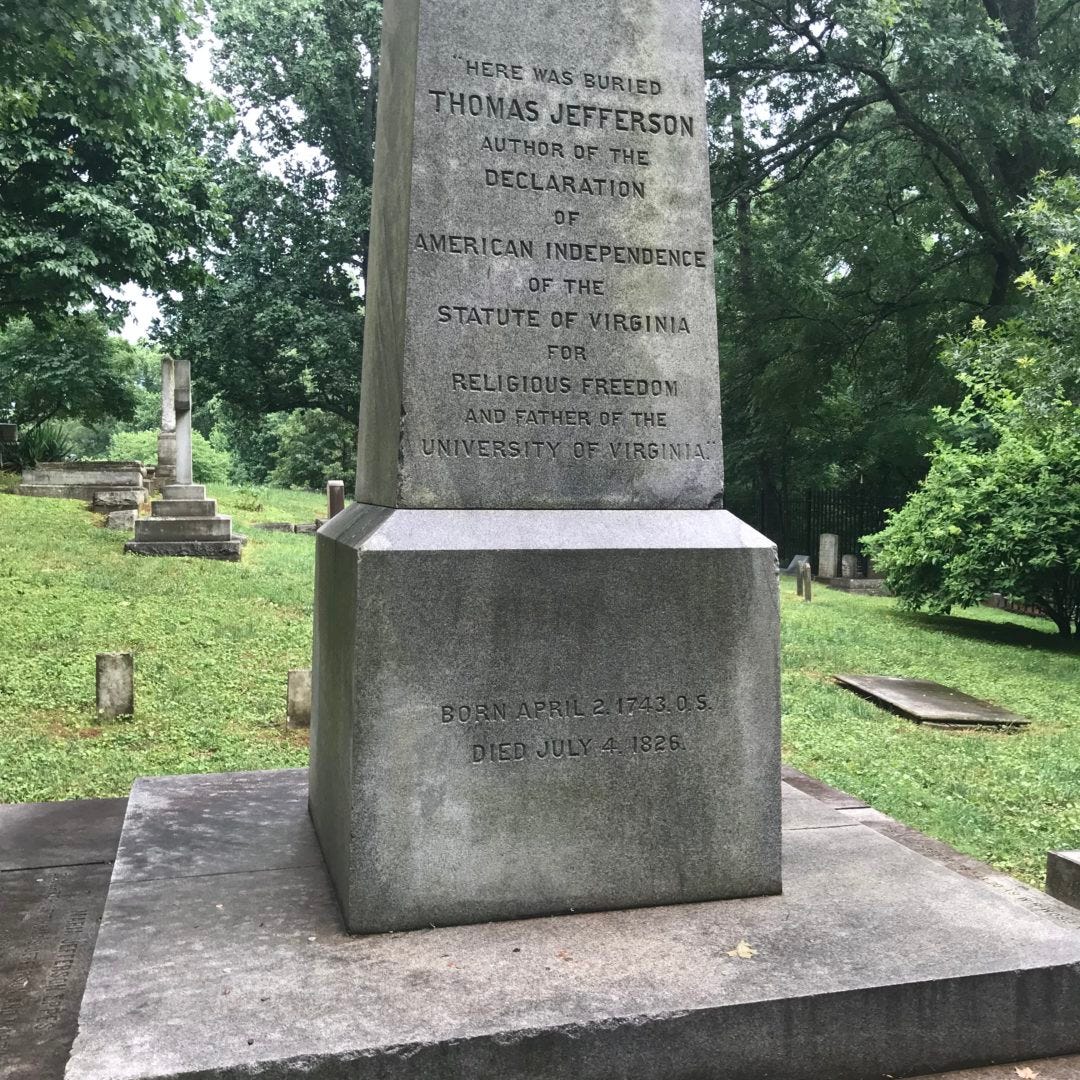
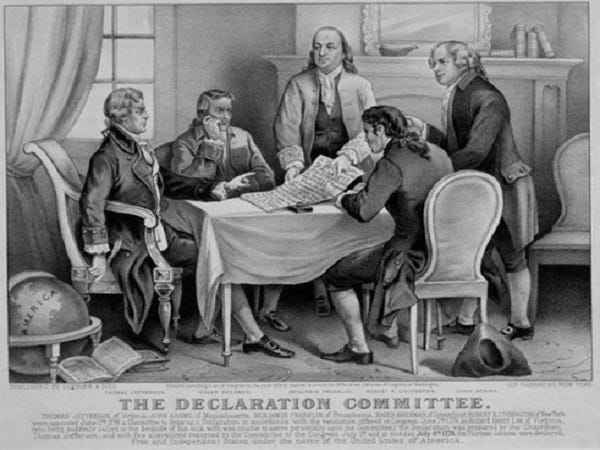
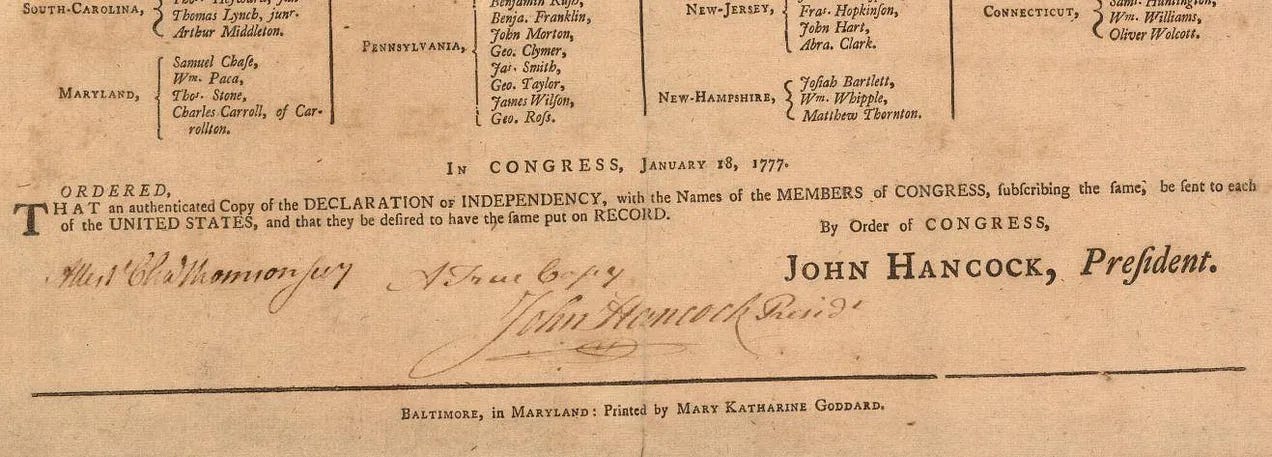
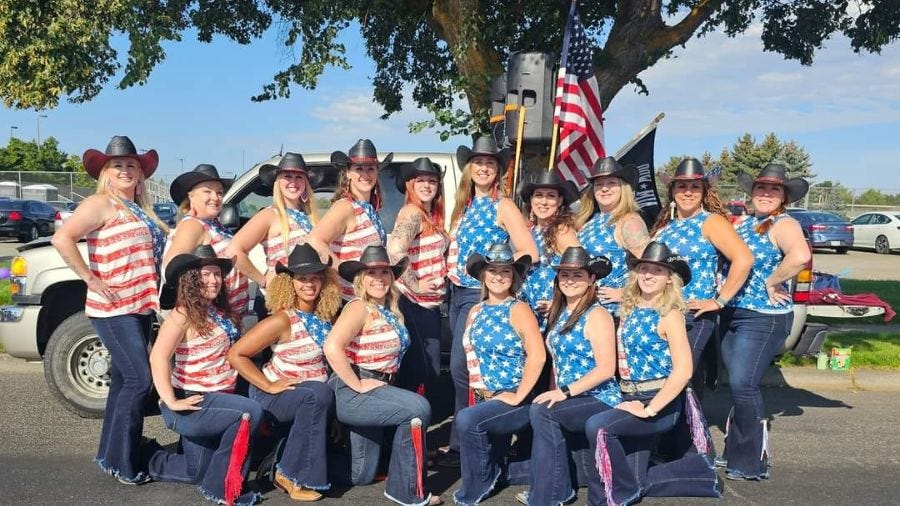

Probably my favorite document of the founding era. Thanks for posting this. Jefferson was an intellectual giant.
Americans are approaching a fork ahead with one road reading future totalitarian enslavement while the other reads this way to pledge your lives, fortunes, and sacred honor.
I am hopeful your wise and timely essay will help us make the right choice.